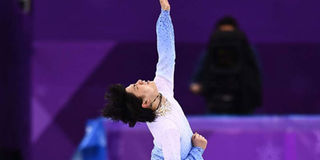Flawless Hanyu dazzles, Shiffrin flops on day of Olympic drama

Japan's Yuzuru Hanyu competes in the men's single skating short program of the figure skating event during the Pyeongchang 2018 Winter Olympic Games at the Gangneung Ice Arena in Gangneung on February 16, 2018. PHOTO | ARIS MESSINIS |
What you need to know:
- A day after she staged an astonishing comeback to win the giant slalom, American ski star Shiffrin finished fourth in her strongest discipline after being sick at the start gate in her first run and initially complaining of virus-like symptoms.
- After the slalom was won by Sweden's Frida Hansdotter, the 22-year-old Shiffrin said that she was pulling out of Saturday's super-G.
- Skeleton speedster Yun Sung-bin dominated the day on the icy chute to win Asia's first medal ever in the daredevil event.
PYEONGCHANG
Japan's defending champion Yuzuru Hanyu produced a stunning short programme to surge into the lead in men's figure skating as Mikaela Shiffrin's bid to retain her slalom title started with her vomiting and ended in heartbreak at the Pyeongchang Olympics on Friday.
A day after she staged an astonishing comeback to win the giant slalom, American ski star Shiffrin finished fourth in her strongest discipline after being sick at the start gate in her first run and initially complaining of virus-like symptoms.
After the slalom was won by Sweden's Frida Hansdotter, the 22-year-old Shiffrin said that she was pulling out of Saturday's super-G.
The Olympics in South Korea has been victim of a health scare with more than 200 people falling victim to a debilitating norovirus, including two Swiss athletes.
Initially Shiffrin said the vomiting "almost felt like a virus kind of puking", but later she said that she was well and had been scratching around for an excuse for her below-par performance.
"I don't feel sick right now, I don't think I have a virus. I was thinking that after the first run, but I think it was me making an excuse," said Shiffrin, one of the biggest names at the Games.
On a day of drama, when South Korea won a lunar new year's gold in the skeleton, Norway's dominance in alpine skiing's men's super-G came to an abrupt end.
Norway have won every Olympic title in men's super-G since the 2002 Games.
But this time the prize went to Austria's Matthias Mayer, the downhill winner in Sochi four years ago, with Norway's best finisher, the defending champion Kjetil Jansrud, taking a disappointing bronze medal.
Switzerland's Beat Feuz took silver.
HANYU FLAWLESS
In figure skating, Japan's Hanyu topped the men's competition with a thrilling short programme, dispelling fears that an ankle injury which has kept him out of competition since November would dent his title chances.
He will take a hefty four-point lead into Saturday's decisive free skating as arch-rival Nathan Chen's challenge came unstuck in spectacular fashion.
Six-time European champion Javier Fernandez of Spain heads the pack chasing after the peerless Hanyu.
"I'm very happy that I skated with no elements I wasn't satisfied with," said the 23-year-old star, who has a cult following home in Japan.
"I did whatever I had to do. I continued to make efforts for the two months during which I couldn't skate. I want to show the results of the efforts (on Saturday)."
Korean new year celebrations, which open Friday, were given a timely boost with a second gold medal of the Games for the hosts.
Skeleton speedster Yun Sung-bin dominated the day on the icy chute to win Asia's first medal ever in the daredevil event.
Roared on by a vocal home crowd, the 23-year-old stormed to a popular victory with plenty to spare over Nikita Tregubov, who took silver as a so-called Olympic Athlete from Russia. Dom Parsons took bronze, Britain's first skeleton medal in 70 years.
The two Swiss athletes became the first competitors infected by the highly contagious norovirus, striking an embarrassment to their Korean hosts.
The Swiss team did not name the duo but said they were no longer showing symptoms that include vomiting and diarrhoea.
Games organisers have issued leaflets and urged people to wash their hands regularly to contain an outbreak that has sickened more than 200 people at the Games, mostly security guards.





